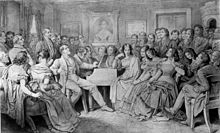Johann Mayrhofer





Johann Baptist Mayrhofer (22 October[1] 1787 – 5 February 1836) was an Austrian poet and librettist. He is best known for his close friendship with the composer Franz Schubert.
Biography
Mayrhofer was born in Steyr, educated at Novitiate in St. Florian's Priory Upper Austria. In 1810 he began to study jurisprudence and theology at the University of Vienna, both of which courses he finished. In 1814 he met the young composer Franz Schubert and his friends (Joseph von Spaun, Franz von Schober).
Mayrhofer wrote a lot of lyric poetry and published it in 1824.
Forty-seven Schubert songs and two of his operas are based on Mayrhofer’s lyric poems.
As a young man Mayrhofer had been hopelessly in love with Mina (Wilhelmina Watteroth), the daughter of Heinrich Watteroth, who was one of Mayrhofer's professors and for a short time also his landlord. In his late years Mayrhofer (like Schubert) fell in love with a young 15-year-old girl, the daughter of his landlord Doctor Strauss. Mayrhofer was a hypochondriac all his life: in 1836, during a cholera epidemic, he committed suicide by jumping from the window of his office in Vienna.[2]
Libretti
- Die Freunde von Salamanca (1815)
- Adrast (1819)
References
- List, Fritz (1921), Johann Mayrhofer, ein Freund und Textdichter Franz Schuberts. Munich 1921. Print: Nittenau: Kangler: [1991]: 226 Bl.
- Rabenlechner, Michael Maria (1938), Johann Mayrhofers Gedichte mit einem Lebensbild des Dichters. Wiener Bibliophilen-Gesellschaft 1938.
- Norman McKay, Elizabeth: Schubert and Classical Opera : The promise of Adrast. In: Erich Wolfgang Partsch (ed.): Der vergessene Schubert: Franz Schubert auf der Bühne. Böhlau, Wien 1997, ISBN 3-205-98749-7, p. 61–76.
- Ilija Dürhammer (1997), »Was ich gefühlt, hast Du gesungen« – Neue Dokumente zu Johann Mayrhofers Leben und Schaffen. In: Mitteilungen der österreichischen Gesellschaft für Musikwissenschaft 31 (März 1997), S.13-45.
- Ilija Dürhammer (1999), Schuberts literarische Heimat. Dichtung und Literatur-Rezeption der Schubert-Freunde. Wien-Köln-Weimar 1999.
- Michael Kohlhäufl (1999), Poetisches Vaterland. Dichtung und politisches Denken im Freundeskreis Franz Schuberts. Kassel 1999.
- Youens, Susan (1999), Schubert’s poets and the making of lieder. Cambridge Univ. Press 1999.
- Lorenz, Michael (2000), Dokumente zur Biographie Johann Mayrhofers. In: Schubert durch die Brille 25, June 2000, 21-50.
- Steblin, Rita (2001), "Schubert’s Problematic Relationship with Johann Mayrhofer: New Documentary Evidence". Essays on Music and Culture in Honor of Herbert Kellman, 2001, 465–495.
- Davidson, Michael; Hillenaar, Henk (2008), Schubert and Mayrhofer. London 2008.
Works
References
- ^ Michael Lorenz "Johann Mayrhofer's Real Date of Birth"
- ^ Susan Youens, Schubert's Poets and the making of Lieder, p. 152
External links
- Mayrhofer, Johann in Constant von Wurzbach: Biographisches Lexikon des Kaiserthums Oesterreich. Vol. 17. Verlag L. C. Zamarski, Vienna 1856–1891, 186-190
- V. Hanus: "Mayrhofer Johann". In: Österreichisches Biographisches Lexikon 1815–1950 (ÖBL). Vol. 6, Austrian Academy of Sciences, Vienna 1975, ISBN 3-7001-0128-7, p. 13 f. (Direct links to "p. 13", "p. 14")
- Walburga Litschauer (1990), "Mayrhofer, Johann", Neue Deutsche Biographie (in German), vol. 16, Berlin: Duncker & Humblot, pp. 574–575
- Literature by and about Johann Mayrhofer in the German National Library catalogue
